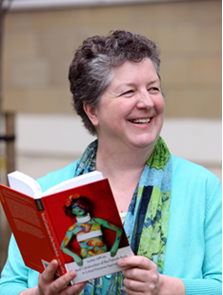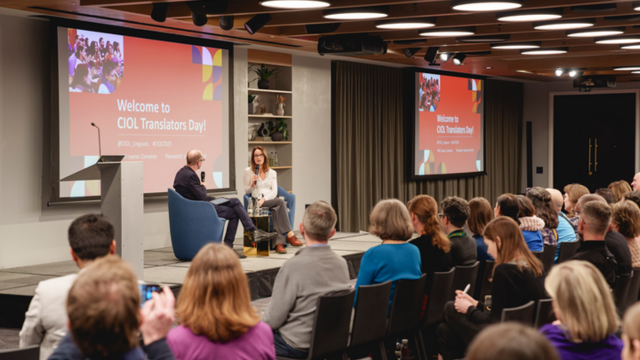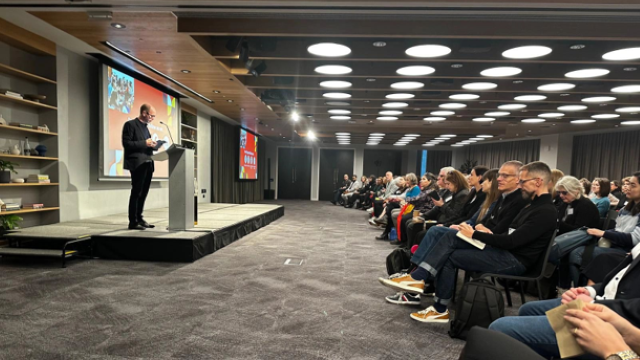-
QUALIFICATIONS
- For Linguists Worldwide
- For UK Public Services
- Preparation
- Policies & Regulation
-
MEMBERSHIP
- Join CIOL
- Professional Membership
- Affiliate Membership
- Chartered Linguist
- Already a member?
- Professional conduct
- Business & Corporate Partners
-
LANGUAGE ASSESSMENTS
- English
- All Other Languages
-
EVENTS & CPD
- Webinars & Events
- CIOL Conferences
- Networks
- CIOL Mentoring
-
NEWS & VOICES
- News & Voices
- CIOL eNews
- CIOL Awards
- The Linguist Magazine
- Jobs & Ads
-
RESOURCES
- For Translators & Interpreters
- For Universities & Students
- Standards & Norms
- CIOL & AI
- All Party Parliamentary Group
- In the UK
- UK Public Services
- Find-a-Linguist
Why Linguistics? National Linguistics Day 2025

by Lesley Jeffries
I’m writing this article on National Linguistics Day (26th November 2026) and wondering how many people will learn something about human communication as a result of it today. It is the brainchild of Rebecca Mitchell and you can see how to join in with plans for future years at this link: https://www.linguisticshq.co.uk/national-linguistics-day.
Up to now, it has been dependent on the efforts of Rebecca and her contacts, but interest in the idea of having a day to celebrate and publicise the importance of Linguistics is growing fast and it clearly has implications for people engaged in language learning and teaching as well as those working in linguistics itself.
Children are open to new ideas, even complicated ones
I recently went on a bit of a rant (https://lesleyjeffries.uk/2025/11/12/health-update-and-some-linguistics/) about the incredible hostility to learning about language to be found amongst parents, some teachers and children’s writers as a response to the clumsy testing regime of year 6 pupils in relation to English grammar and the particular hatred that seems to have arisen for what’s termed the ‘fronted adverbial’.
Whilst the value of the testing regime is definitely worth discussing, it seemed odd to me that we teach young children quite complex science and maths but are reluctant to give them the same level of knowledge about how our species communicates. Young children are open to new ideas, even complicated ones, if they are taught in an engaging way and the anger directed towards this part of the curriculum seems to me misplaced.
I think the focus on the fronted adverbial reflects, in part, a different problem: the fear that adults (including some teachers) may feel when confronted by terminology they have not encountered themselves. No one seems to be cross about children being taught to recognise nouns or verbs, so it is perhaps more a question of training and good materials for the adults that might need to help children in their learning.
Linguistics won't frighten the kids
The second aspect of the problem is the confusion between language knowledge (i.e. linguistics) and what’s usually called ‘English’ in schools. Of course, learning to recognise certain structures in your own language(s) and any you might be learning can be helpful, but it isn’t necessarily the only or best way to encourage reading and writing, as many of its critics rightly point out. Engaging with imaginative story-telling and well-written factual texts at age-appropriate levels is clearly a vital part of learning to be a literate, independent-minded and creative citizen.
Nevertheless, I would argue that the national curriculum should include content about human communication as a vital part of children's learning in its own right. Whilst new developments in citizenship, financial understanding etc. are maybe fine as additions to the curriculum, if we want pupils to really understand the modern world we live in, then communication through language is a massive part of what is going on (see Artificial Intelligence, internet content and influence). Its importance is such that I'd argue that knowledge about communication should be on a par with core subjects like maths and science and should not just be a sub-part of something called 'English'. Indeed, it would also be better to learn about language not just through English, but through all the languages pupils speak at home or might learn in due course to make them citizens of the world. I'd not be afraid to call it what it is - Linguistics. This won't frighten the kids even if it frightens some of the adults!
Linguistics can be taught in interesting and age-relevant ways
There is, of course, a question to be asked about whether grammar is the only - or most important - aspect of language knowledge to teach at this age, or whether, perhaps, some other aspects of language knowledge might be introduced early in their education. Learning phonetics (e.g. how we speak physically); sociolinguistics (e.g. how our language varies according to background and how we judge people by their accents); pragmatics (e.g. how we mean things without exactly saying them); discourse (e.g. how we put together arguments into coherent or persuasive texts) are all part of the range that linguistics encompasses in addition to narrow concepts of grammar. And they can all be taught in interesting and age-relevant ways.
Teachers may need to be provided with a better understanding of/background in linguistics in order to teach knowledge about language effectively. There is a large cohort of linguistics/languages academics waiting to be asked to help and if we want them all to succeed, we should not allow such contributions to be filtered through politicians’ sometimes outdated ideas of what children should learn and be tested on. Let us trust the professionals!
And it underpins reading, writing, literature and all the verbal arts
Finally, I would ask that we consider the importance of linguistics in learning to read, in learning to write and most importantly for learning to appreciate literary and other verbal arts. Despite the failures of the curriculum that many so despise, this is not a reason to ignore the fact that, like learning to play an instrument, real appreciation of literature can be enhanced not just by the experience of reading it, important though that is, but also by learning to understand how it works in a more conscious way. This doesn't have to be boring and it can start gently at the younger ages, but it would involve (yes!) a bit of basic grammar and I can't see a problem with that.
We who care about - and understand - how language works need to work together to keep this vital area of study alive at all levels, from primary to university. With my co-editor, Dan McIntyre, we use our magazine, Babel (https://babelzine.co.uk/) as a platform to spread the word about how important linguistics is in all areas of life. We're also both researchers who work on literary language as well as other types of text. Our field is called 'Stylistics' and we see it as central to linguistics, useful to language learning and teaching and very helpful in literary studies too.
Linguistics is well worth celebrating - and teaching, sharing and learning!

Lesley Jeffries is Honorary Professor of Linguistics at Lancaster University
Views expressed on CIOL Voices are those of the writer and may not represent those of the wider membership or CIOL.
More
The Chartered Institute of Linguists (CIOL), Incorporated by Royal Charter, Registered in England and Wales Number RC 000808 and the IoL Educational Trust (IoLET), trading as CIOL Qualifications, Company limited by Guarantee, Registered in England and Wales Number 04297497 and Registered Charity Number 1090263. CIOL is a not-for-profit organisation.








